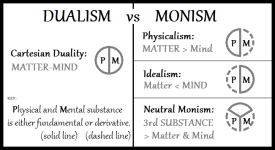fromderinside
Mazzie Daius
- Joined
- Oct 6, 2008
- Messages
- 15,945
- Basic Beliefs
- optimist
Good post, but why then do you say consciousness doesn't exist or isn't generated by the brain? Even if the conclusions we draw from our subjective states aren't necessarily accurate, there's still the phenomenon of firsthand experience. Illusions aren't what they seem to be, but they are something rather than nothing.
Good point. My take is that they are similar to the availability of process state status at a readout point of a system performing the process. If that point is continuously monitored you have a portal to consciousness of on going process states. Now if that point is logically connected into other processes I see no reason to make a big deal of it unless that process readout is telling us something important about the functionality of the machine doing the processing which is why that readout has an available continuous readout. Self referencing indeed. Not enough to demand thingness for a readout though.
BTW Shannon modeled information after statistical thermodynamics.
Another thought. matter is neither created nor destroyed, but, humans live and die making and using information during their interval of life. Kind of like the distinction between information and matter. I say leave thingness to matter.
Why, after all, would we equate measure to physical existence?


